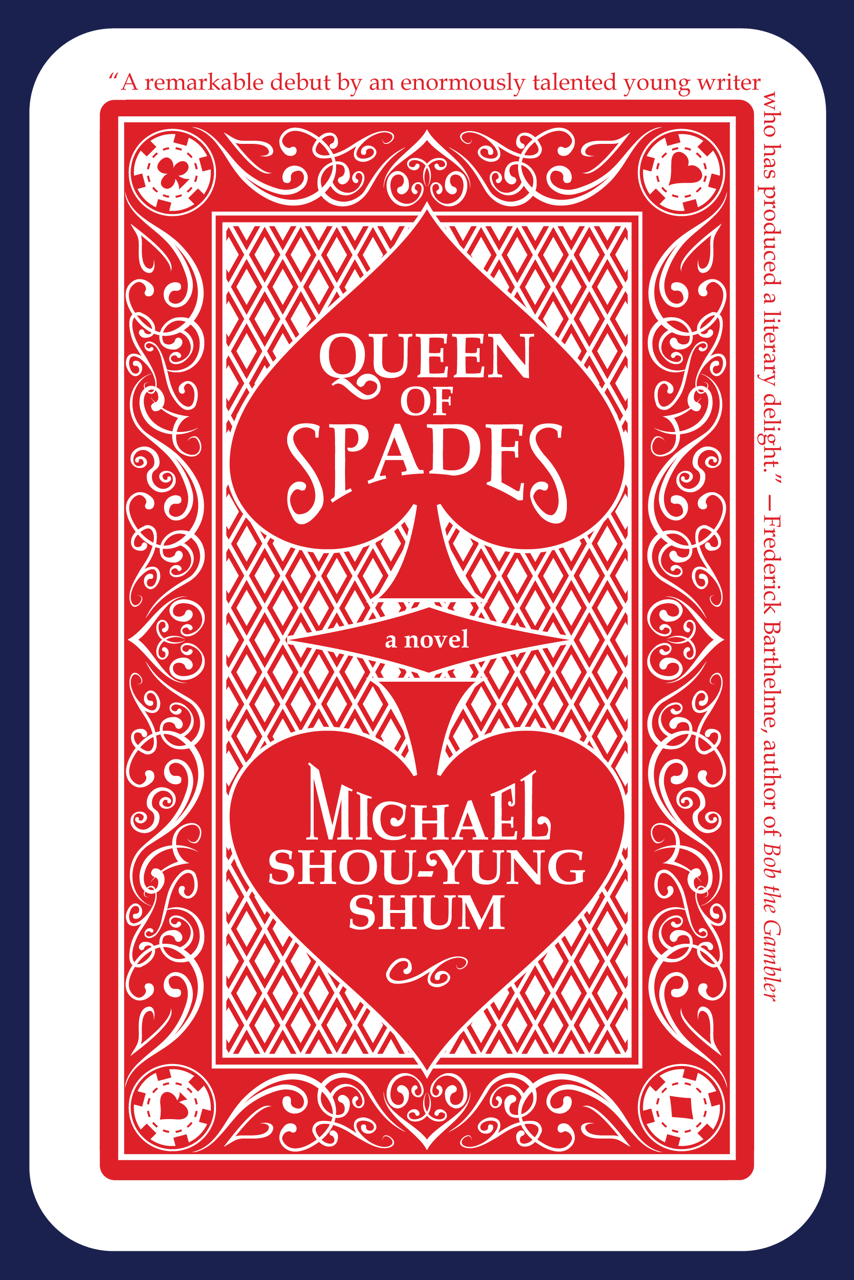Q&A with Michael Shou-Yung Shum, author of Queen of Spades
Chan lowered his hand slowly and extended his index finger, hovering, over the final card. then, with the faintest, deftest movement, he issued the card through the slot. it spun out, revolving lengthwise in the air, describing an ancient, flawless arc as it fell toward the table. In his incredible debut, Michael Shou-Yung Shum builds off Pushkin's story of the same name to create something wondrous and new. Set in a small casino in the Pacific Northwest, the book places us within the world of gambling as seen through the eyes of pit bosses, dealers, and high-stakes gamblers. With an unbeatable sense of pacing, Shou-Yung Shum builds the tension until it's almost unbearable for characters and readers alike.
Victoria Fullard: Your book, Queen of Spades, is adapted from Alexander Pushkin’s short story of the same name. How did you first become familiar with Pushkin’s story, and what inspired you to adapt the famous tale of avarice? Michael Shou-Yung Shum: My brother, Matthew, recommended the story to me at a family gathering about twelve or thirteen years ago, based on my interest in gambling. I was hooked on its style and its tone, which imbued the world of 18th century gambling with a mystical veneer, and I gradually grew obsessed with its plot points: the Countess and her gambling secret, her corpse winking at Herrmann, etc. The ending, with Herrmann in an asylum, disappointed me, however—I began imagining what would happen if he’d won rather than lost the ultimate hand? VF: Your book is set in a small town in the Pacific Northwest—not exactly the American locales most associated with casinos and gambling. How important was setting and location to your story? MS-YS: It was extremely important—it is a cliché but there really is something about the Pacific Northwest, its natural beauty, that imbues the region with a sense of ancient mystery. It’s the opposite of Las Vegas, in many ways, and their only commonality may in fact be the legality of gambling! Placing my strange gambling tale in the Seattle area was a natural fit for this reason, as well as the fact that it was also the area where I worked as a dealer and learned firsthand how important it was to enchant my own experience. VF: Some of your characters embrace intuition, using feelings and the unseen to guide them through life. Others are more logical and cerebral. In the end, which approach is better? Which leads to greater happiness? MS-YS:I think the obvious answer is that one needs balance between the two, although my preferred option is intuition—but with one huge caveat: only after you have carefully developed and refined it through years of reflective practice. Otherwise, unexamined, intuition can often lead you down the wrong road. The danger of logic and reason is that if you rely on them as a default, you become less attuned to your own natural sense of things—how do you make decisions when there is great uncertainty and incomplete knowledge? Perhaps one important life skill is learning what situations favor which. VF: What is your writing process like? From where do you draw inspiration? MS-YS: My writing process is haphazard and is still a work in progress. I do what writers are not supposed to do, which is write when the inspiration strikes me. I need to develop better habits. Having said that, I write quite quickly when I am in “the zone:” the first draft of Queen of Spades was written in a year, during which I was also teaching and taking my three PhD qualifying exams. Many chapters “wrote themselves.” VF: This was your debut novel. What should aspiring writers know about the publishing process? Was it what you expected? MS-YS: I cannot heap enough praise on my publisher, Laura Stanfill, for being a tireless advocate for the book. I feel that fate placed us together. But before we found one another, I experienced what most writers know about already: endless rejections of queries to agents and publishers, the growing fear that you have written an unpublishable manuscript, etc. The lesson I try to tell writers in the same shoes is that if your manuscript is good, it will find its rightful home. It really is all that matters, or at least 98% of all that matters. Focusing on other things, like your social media presence, is just a distraction. VF: What are you working on now? Another adaptation? MS-YS: I am in the formative stages of writing a novel in the form of an investigative report about a new method of sleeping called “fast sleeping,” where you get more out of sleeping less. It will have aspects of a horror-thriller, as the reporter is drawn more and more into strange institute that studies and practices this form of sleeping. Some of the chapters will “happen” in that half-conscious state when we are not quite asleep, not quite awake. VF: Fill in the blank (hopefully in an unexpected way): People who like ________ should read Queen of Spades. MS-YS: People who like vegetables should read Queen of Spades. |
